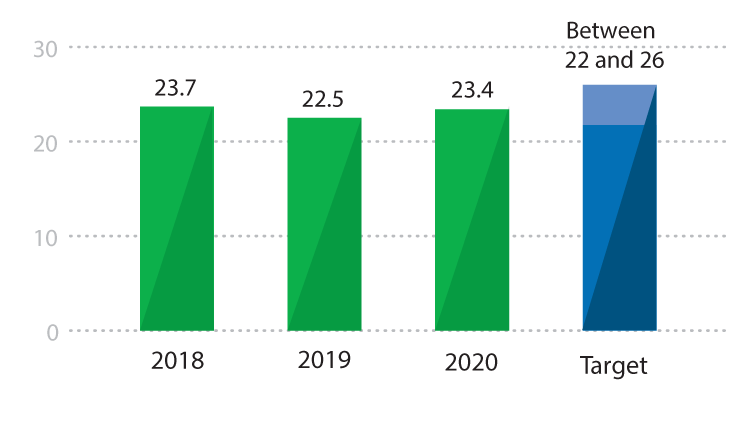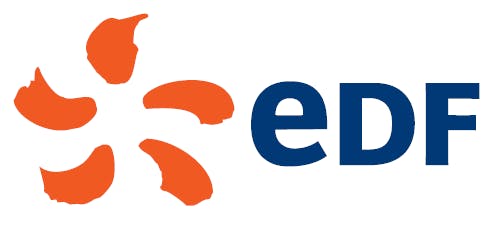This policy must be applied throughout the Group, by all controlled entities regardless of their nature or geographical location, with the exception of regulated infrastructure managers, for whom it constitutes a guide. All Group staff must comply with this policy which aims to protect the Group’s reputation and to reduce any tax risks to which it may be exposed through its activities. The policy follows the following guidelines:
- strengthen the tax performance of the Group in strict compliance with national and international tax laws and regulations;
- control tax risks through continued, systematic improvement, in all Group entities, of the identification and management of fiscal risks;
- implement the tools, reporting and actions necessary for the continued, optimum, forward-looking management of tax cash flows (1), as well as attentive and proactive monitoring of the Group’s effective tax rate;
- ensure the conditions necessary for obtaining constructive relations with the tax and government authorities of all kinds by maintaining a transparent, professional relationship with them.
Ethical principles
In the context of the allocation between countries of operating margins internal to the Group, EDF strives to apply a transfer price policy in accordance with the principles of the OECD to justify the resulting revenues. EDF has no legal implantation(company, branch or office of representation) in a territory listed as a non-cooperative state or territory as defined by French and international legislation which is not determined by economic activity reasons and under no circumstances purely by tax reasons. Similarly, cash flow through these countries is prohibited where it is for tax reasons only.
Presence in Luxembourg and Ireland
Like all major French and international groups, EDF relies on captive and mutual insurance companies to supplement the cover provided by traditional insurance markets. The captive and mutual insurance companies enable EDF to reduce the cost of its insurance schemes and the total sum of premiums paid. EDF has three captive insurance companies, based in Ireland and Luxembourg:
- Wagram Insurance Company DAC. (wholly owned by EDF), an insurance company founded in 2003 in Dublin which is involved in the majority of the Group’s insurance schemes;
- Océane Ré (wholly owned by EDF), a reinsurance company founded in 2003 inLuxembourg to reinsure EDF’s nuclear civil liability risk;
- Tereco (wholly owned by Framatome), a reinsurance company within the Framatome consolidation scope located in Luxembourg, to reinsure a portfolio of risks including that of Framatome’s nuclear civil liability.
3.4.2.2.2 Taxes paid by the Group
In 2020, the EDF group’s tax liability(2) was €3,797 million, an increase of €1 million compared to 2019.
The EDF group thus contributes to the development of the French regions through an annual payment of more than €1.8 billion in local taxes to local authorities.
The income tax expense amounted to (€945) million in 2020, corresponding to an effective tax rate of 73.1%(3) (compared to an expense of (€1,532) million in 2019, corresponding to an effective tax rate of 23.96%). The €587 million drop in income tax expense between 2020 and 2019 is analysed in section 5.5.5 “Income taxes”.
Income taxes paid by the Group amounted to €983 million in 2020 (€922 million in 2019)(4).
Income tax paid in all the countries where the Group has subsidiaries is detailed in an appendix, in section 3.9.5 “Further detail of income tax paid in all countries where the Group has subsidiaries".
3.4.2.3 Contribution to development through purchasing
3.4.2.3.1 Amount of local purchasing
The Group Purchasing Department continues to interact with suppliers – including SMEs, ISEs, VSEs and start-ups – with the operational implementation of a process adapted for innovative purchasing and to make it easier for SMEs to access EDF’s markets. This entails the acceptance of:
- simplified general terms and conditions of purchase and special terms and conditions for “small orders” (online on the Provider dedicated portal on the www.edf.fr ⓦ );
- a simplified capacity questionnaire for new suppliers, for tenders with amounts lower than the thresholds of European Directive 2014/25/EU;
- a tailored purchasing process and standard agreements for innovative start-ups and SMEs (45 tests, €1.6 million of innovation purchases in 2020);
- a dedicated space on the www.edf.fr ⓦ institutional site (single point of access).
In terms of purchases from SMEs located in France, the target range is between 22%and 26% of purchases by EDF and the distribution network manager, Enedis(5). For 2020, this figure stands at 23.4%, within the target range.
Annual rate of procurement from SMEs in France (%)

2018 : 23.7
2019 : 22.5
2020 : 23.4
Target : Between 22 and 26
Key non-financial performance indicator
The methodology for this indicator is set out in detail in section 3.7.2.2"Details on performance indicators".
In 2020, as part of the consultation process, the Purchasing Department keeps on encouraging tier-1 suppliers to employ local suppliers meeting the requirements of European Directive 2014/25/EU, for work or service contracts on electricity generation sites. Carrying on from the efforts made in 2019, the Purchasing Department is involved in the “Destination ETI Smart City Utilities” programme run by the Pacte PME association and various events organised by BPI France and chambers of commerce. It runs awareness-raising campaigns for SMEs regarding the contracts and authorisations required to tender for EDF group contracts and puts them in touch with interested business lines and subsidiaries. It also assists business lines, to help local companies access decommissioning projects (Brennilis, Bugey, etc.) or take part in calls for tenders for the Grand Carénage refurbishment projects.
As a recent example, more than 4,000 businesses are registered on the HPC supplier portal for the EDF HPC project. Local suppliers sign contracts directly with HPC or with its tier-1 suppliers. Since the start of the project, £2.2 billion has been spent with regional suppliers directly. Likewise, for the new Romanche Gavet power plant, its inauguration in September 2020 marked a key stage in the Romanche Valley hydroelectric reconfiguration project: in terms of its contribution to local economic development, 637 companies and subcontractors worked on the project and orders worth €108 million were placed with local companies in Auvergne, not to mention the 306 FTEs working at the peak of the project.
(1) Tax cash: tax actually paid or recovered.
(2) See note 5 of the appendix to the consolidated statements on the “Operating profit before depreciation and amortisation”.
(3) See note 9.2 “Reconciliation of the theoretical and effective tax expenses (tax proof)” in the notes to the consolidated financial statements.
(4) This information has been restated for the IFRS 5 impact of the E&P business being sold.
(5) Enedis is an independently managed subsidiary.
